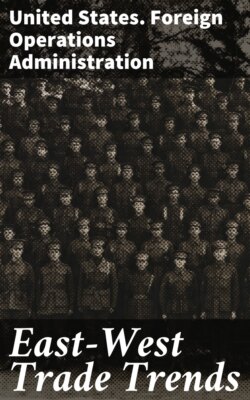Читать книгу East-West Trade Trends - United States. Foreign Operations Administration - Страница 11
На сайте Литреса книга снята с продажи.
Letting Off Pressure
ОглавлениеTable of Contents
In the summer of 1953 came the electrifying news of rioting in East Germany.
Also in the summer of 1953, new economic targets were announced in the U.S.S.R. and some of the satellites. These new targets—which will be discussed further in a moment—were said to be a means of improving the lot of consumers.
Some observers in the West assumed that economic difficulties in the bloc were erupting with such force that they threatened to topple the Malenkov regime. This interpretation is understandable—any democratic nation would have long since replaced a regime that in peacetime so subjugated the needs of the people—but such an interpretation of the Soviet scene must be viewed with great skepticism. At this writing there was some evidence that the problems faced by the Kremlin may in some respects have become more difficult since Stalin’s death, but one could not infer that the chronic economic difficulties of the Soviet bloc were especially different in nature from previous post-war years, nor that the Communist governments with their inhuman police control were about to collapse.
What the Communist rulers were facing was their perennial problem of developing lopsided economies without letting the lopsidedness become so repressive on the people as to upset the plans and timetables. Even in police states there are physical and psychological limits beyond which human beings cannot be driven without lowering their incentives, their energy, their morale to the degree that production is severely hampered. The Soviet leaders have always recognized this. At three different periods in the thirty-odd years of their control of the U.S.S.R. they have shown themselves adept at opening the valves enough to relieve accumulating pressures and then shutting them again—always without swerving very far in the basic drive to build the industrial-military machine.
Many observers believe that even prior to Stalin’s death the time was ripe for a slight relaxation in the postwar consumption squeeze. The Kremlin faced multiple problems in consolidating its new empire. External foreign developments had been adding to the difficulties of achieving the overambitious industrial and military goals. Western export controls on the shipment of strategic goods into the bloc had been impeding the planned development of the military sectors of the economies.
In any event, a close examination of the new actions proposed by the Malenkov regime to improve the consumer’s lot, insofar as they have been revealed, indicate that plans for heavy industry and for military preparation will not be materially affected.
